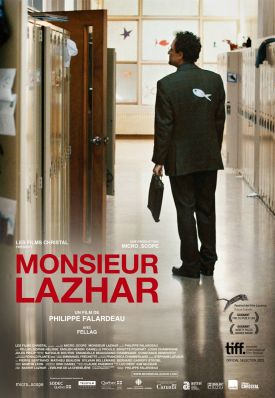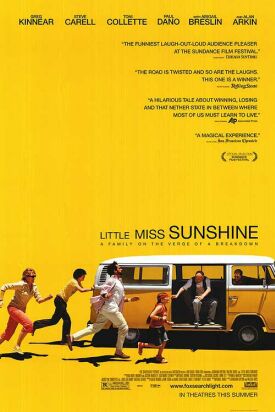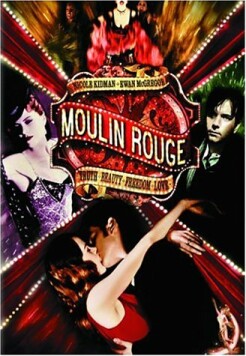Monsieur Lazhar
One of the best moments of Monsieur Lazhar by the Québécois writer-director Philippe Falardeau comes when 12-year-old Marie-Frédérique (Marie- ve Beauregard) rises in the midst of an impromptu (and forbidden) class discussion about the suicide of a teacher and says this: “Everyone thinks we’re traumatized by Martine’s suicide, but it’s the adults who are really.” The discussion has been forbidden on the advice of the school psychologist (Nicole-Sylvie Lagarde), acting as specialist grief counselor. She, by teaching them that grief is the province of some “expert” prepared to treat it as a pathological condition, would have robbed these children of the vital experience of learning how to deal with a normal but painful part of life. That the discussion breaks out anyway is thanks to their new Algerian teacher, the eponymous Monsieur Lazhar (Fellag) who, uncorrupted by specialist educational training, is generally prepared to disregard unnecessary and harmful rules laid down by those more expert than he.
To get the full impact of Marie-Frédérique’s moment of blinding insight, you have to take it in the context of an earlier discussion between her insufferable yuppie parents (Stéphane Demers and Nathalie Costa) and Monsieur Lazhar at a parents’ evening. Clearly, they have not come to learn anything from him about their daughter but rather to instruct him, in an offensively patronizing way, about how he should do his job. Equally clearly, Marie-Frédérique understands her parents and the adult world generally far better than they understand her or the educational process that must increasingly take place out of their sight, if it is to take place at all. One gathers that parents like these are not untypical these days, though they or anything like them would have been almost unheard of when I was a teacher.
This is just one of the ways in which the film shows us how the inevitably two-way process of educating the young has been narrowed and restricted to the point where it is being utterly stifled, all supposedly in the interests of the young, and for their better protection from the shocks and hazards of the adult world, but in fact to their very considerable detriment. In fact, Monsieur Lazhar is really a critique of today’s educational orthodoxies but one which is well-disguised from the dominant culture that routinely defers to those orthodoxies. The disguise takes the form of the twin emotional traumas at the movie’s heart: the suicide of the former teacher and the terrible, searing bereavement suffered by the new teacher, M. Lazhar, whose whole family (a wife and two daughters) have been murdered by terrorists in Algeria on the eve of their departure for Canada.
Emotionally, the bond that develops between teacher and pupils as a result of their shared experience of grief is so compelling that it may be easy to overlook the film’s scathing criticism of received opinion — which must be why it even gets the imprimatur, sort of, of The New York Times:
Although it looks askance at the extreme measures parents and teachers take to protect children, often more knowledgeable and resilient than they’re given credit for, it acknowledges that some do need protection. It especially calls into question the strict modern rules that forbid any physical contact between teachers and students who in moments of crisis feel a desperate need for the comfort and reassurance that a hug can provide.
This even though, writes Stephen Holden with the same patronizing tone as Marie-Frédérique’s parents, there are “glitches” in Bachir Lazar’s understanding of the ways of the enlightened West. “Most important” among these is that “he doesn’t know the rules about physical contact and lightly cuffs an unruly student.” On the contrary, there is every indication that he does know the rules — and that he is prepared to disregard them when necessary, and when they richly deserve to be disregarded.
Count them up: there is hardly an educational shibboleth that goes unassailed here, beginning with the no touching, no hitting rule. “We handle kids like radioactive waste,” says the otherwise comic P.E. teacher Gaston (Jules Philip) who, with M. Lazhar, makes up two-thirds of the school’s male faculty: “Touch them and you get burned.” It emerges that Simon (Émilien Néron), the boy M. Lazhar cuffs, had also been hugged by his predecessor and, with the mischievous officiousness of youth, had reported her to the principal (Danielle Proulx) for it. He had then also been the one to discover her body, hanging from a pipe in their classroom. Both his classmate Alice (Sophie Nélisse) and his own smitten conscience suggest that he may be guilty in her death, and there is an immensely moving scene in which poor Simon, in the course of the forbidden discussion mentioned above, gives vent to his anguished feelings — and is comforted by M. Lazhar with a caress.
The suggestion is that both the cuff and the caress, like Martine’s fatal hug and the forbidden discussion of it, are natural and necessary parts of the educational process which can now only take place surreptitiously and out of the eye of authority — mainly because the teacher’s own organically-grown and well-earned authority over those he teaches, as a result of being contemptuously treated by law and officialdom and divorced in the name of “professionalism” from the love that naturally attends it, has been so far eroded. How has this happened? By cowardice, social snobbery, legalism, over-protectiveness, bureaucracy, feminist ideology, credentialism and the dumbing down of the curriculum, among other ills, none of which can be discussed frankly, as Bachir and his kids defiantly discuss the suicide of Martine, and all of which are at least alluded to in the course of Monsieur Lazhar. It’s a very clever way of smuggling that discussion in under the cultural radar, but I wonder how many of those who see it will find it there, under the surface of this beautiful and moving film?
Discover more from James Bowman
Subscribe to get the latest posts to your email.






